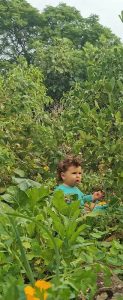Leila Alexandra on forage gardening
Leila Alexandra, from Pascoe Vale South, runs a garden consultancy called Barefoot Food Gardens, where she turns her forage gardening ideas into reality.
 Forage gardens are abundant habitats that connect us to an ancient way of being, in harmony with nature’s rhythms and all living creatures. They are ecosystems with all kinds of food plants, medicinals, soil-improving plants, insectary plants, mulch plants, native species, flowers, wild foods and edible ‘weeds’.
Forage gardens are abundant habitats that connect us to an ancient way of being, in harmony with nature’s rhythms and all living creatures. They are ecosystems with all kinds of food plants, medicinals, soil-improving plants, insectary plants, mulch plants, native species, flowers, wild foods and edible ‘weeds’.
Such wild gardens can’t be designed; rather, the focus is on creating conditions for them to flourish and increase in complexity and productivity over time. The role of the gardener is one of intuition, reflection and nurturing, with moments given to tending here and there. The philosophy is what is important.
Forage gardens are similar in concept to food forests, the main difference beings that forage gardens look more like a garden than a farm or forest and are suitable for small spaces, the urban environment and modern lifestyles.
Ecosystem understanding
The first step to creating a forage garden is learning to see your garden, both above and below the ground, as an ecosystem. Ecosystems provide plants with all their needs:
 Light: multilayers create varying degrees of shade.
Light: multilayers create varying degrees of shade.- Water: climate and topography creates varying moisture.
- Soil: groundcovers and leaf litter protect soil, there is decomposition and disturbance.
- Diversity of life: pest and disease balance, fertility from nutrient cycling.
Create complex habitats in which the processes mimic those of natural ecosystems. See all living things, including weeds (many of which are edible) and garden creatures, as friends that live together in harmony. Plant a range of species, including small trees and shrubs, flowers, groundcovers, nitrogen fixers and complementary plants. Let plants live out their life, flower, sow seed and decompose in situ (chop and drop).
Care for the soil by practising minimal soil disturbance, keeping the surface covered, and building soil health – add organic matter, plant green manures, deep-rooted perennials, nitrogen-fixing plants and wild plants.
Effortless and experimental
Once a forage garden is established, it requires little work. As you establish the garden, practise close observation and experiment – you’ll learn intuitively which activities are worthwhile. Tune in and spend time amongst the plants as they change with nature’s cycles – they will be your teachers. And don’t be afraid to go against prevailing advice – keep experimenting!
